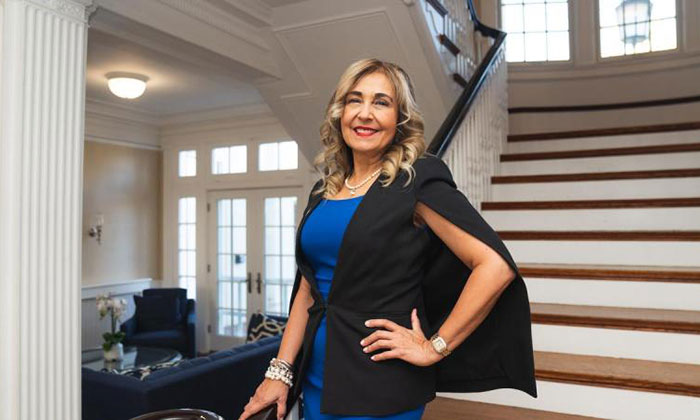Courtesy: Abdullah Konte/WBJ
When Irma Becerra fled with her family from Cuba to Puerto Rico, she built a new life there based on the advice of her grandparents: No matter what you lose, no one can ever take away your education.
She didn’t ever picture herself becoming a university president. When she took on the role at Marymount University in 2018, she joined a small cohort of historically underrepresented trailblazers. Latina women only joined the ranks of college presidents less than 40 years ago.
Increasing representation has become a hallmark of her leadership at Marymount, which operated on $115 million in revenue last year. This year, it became Virginia’s first institution to earn the Hispanic-Serving Institution designation. Last fall, the university enrolled 31% Hispanic/Latino students, 30% white students, 14% Black students and 6% Asian and Asian American students. The institution also enrolls dozens of students who are undocumented or are part of the Deferred Action for Childhood Arrivals program each academic year.
She also worked alongside Virginia legislators to award $4,500 in annual tuition to any high school graduate who attended a Virginia high school for at least two years, and forged a partnership with TheDream.US, the country’s largest college access and training program for undocumented students.
Q&A
Why is it important to you to advocate for students to be eligible for state and federal financial aid, regardless of their citizenship status?
When it came time for me to go to college, I was able to get Pell Grants, loans, scholarships, work and essentially put myself through college. The difference with undocumented students who have lived here their whole life, and DACA students, is that they’re not eligible for these same forms of federal aid.
What is something people who aren’t immigrants don’t understand about people who are undocumented?
There is probably, in general, a lack of knowledge of, “How did this happen?” A lot of times people ask me, “What’s your journey? How did you end up here in the United States?” It’s my responsibility, since I’m here, to share my journey.
As Virginia’s only Hispanic-Serving Institution, what are some of the unique needs of the Latino student body and how do you seek to meet them?
Higher ed is the key to higher earnings for a lifetime, and so the practical focus of the education here at Marymount resonated with me personally. We put a lot of wraparound services around our students because we are zeroed in to the graduation rate.
What was your experience as a Latina, immigrant woman making your way in a largely white male-dominated field like engineering?
As a woman, I had never played with electronic components my whole life. I felt a little bit challenged in comparison with some of my classmates that, as kids, had played with electric components. I did have to work a little harder. I did love electrical engineering because there was so much math involved. There may have been a number of instances where maybe someone made a comment that was a little not appropriate, but I just kept focused and kept going.
What do you want Marymount students to come away with for their world view on equity?
In these days of really deep polarization in our country, I think for Marymount, we see diversity as a source of strength. We have not had clashes of perspectives here, I think, because we are so diverse to begin with, that we’ve created an environment that is supportive of diversity, including diversity of thought.
Where can Marymount grow or do more in terms of inclusion?
We really need more scholarships. When you look at our student population, about anywhere between a quarter to one-third of the students that come to Marymount are Pell-eligible.
What are some examples of recent DEI initiatives at Marymount?
We started the on-campus Diversity, Equity and Inclusion Center. We have a Truth, Racial Healing and Transformation Campus Center. We recently hired our first assistant provost of diversity, equity and inclusion, Natoschia Scruggs.
How do you recharge?
I’ve made it a point to exercise every day. Sometimes I need a day where I’m just like, “I want to do nothing.” I also love spending time with my family. We love to travel together, to go every year to a place where we haven’t been.
“If you Google DEI, up should pop a picture of Marymount University President Irma Becerra. She has demonstrated remarkable leadership on issues related to creating an inclusive environment at Marymount.” – James Dyke, senior adviser at McGuireWoods Consulting and Marymount University trustee
Read the original story on the Washington Business Journal’s website.





